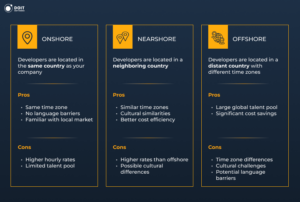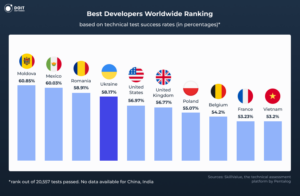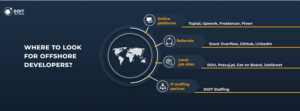Looking to expand your team with experienced offshore developers? And you’re not alone, as nearly 64% of companies find use of offshore/nearshore locations for software development. To hire skilled offshore programmers, you need to know where to source talent, how to deal with time zone differences and remote workflow, and at the same time save the development budget.
But don’t worry, this article is your go-to guide for all you need to know to make a successful offshore hire. Below, you will find:
Keep reading to find out how to hire offshore software developers who fit your budget and company culture.
Offshore developers are IT specialists who work in countries far from the company’s headquarters. They often operate overseas remotely with a time zone gap and lower labor costs.
For example, if your company functions in the US, you can hire offshore developers from India or Eastern Europe. At the same time, if your business is located in Western Europe, you can choose LATAM developers as offshore workers.

Hiring overseas developers has many advantages, so let’s take a look at how you can benefit from this model.
1. Cost savings
One of the most significant benefits of hiring offshore developers is cost efficiency. It allows your company to bring on more highly skilled professionals for the same or even a lower budget compared to local IT recruitment services.
First of all, offshore locations have lower living costs and less tax burden. For example, Eastern European senior software developers earn $50-$99/hour vs $250-$380 in the US.
And the second factor is that you can eliminate overhead expenses related to office space and save on benefits (often, the savings are directly proportional to the difference in the rate).
Thus, offshore development reduces labor costs by 40-60% compared to hiring in-house or in high-wage regions like North America.
2. Access to a global talent pool
With 28.7 million software engineers worldwide in 2024, nearly 15% of them are located in the US. But, at the same time, over 47% of recruiters report challenges finding qualified candidates. And 1 in 6 businesses can’t stand out from other companies to attract the talent. This is where offshore hiring comes in.
The Central and Eastern European region alone boasts over 1 million software developers, with 401 thousand in Poland and 200 thousand in Ukraine. Latin America also provides 835 thousand coders. And how not to mention one of the largest offshore hubs, India, with 5+ million developers.
These regions have significant human resources in modern technologies and emerging fields such as AI/ML and blockchain that may be scarce locally. And hiring here is usually less competitive. So it’s easier to find the perfect fit for your project’s needs.
3. Faster time-to-market
Offshore talent can accelerate development cycles if managed properly. For example, handoffs between Asian and European teams enable 18-hour productivity windows. And if you have an in-house team in the US, you can have day and night shifts with real-time collaboration for morning meetings and evening debriefs.
Moreover, offshore teams usually have ready-made expertise processes. Experienced talent vendors can reduce onboarding time by 30–50% compared to building in-house teams.
Developers with varied cultural backgrounds can better adapt to market shifts. Eastern European developers, for example, blend technical rigor with creative problem-solving, while Latin American teams excel in agile, customer-centric workflows.
Now, let’s have a further look at countries’ differences when hiring offshore developers.
To conduct an effective search for the best offshore developers, we recommend you select one target region to start with. There are many popular offshore locations, and hiring processes here can be quite different.
So, let’s first analyze offshore developer regions and then move on to a granular country-by-country comparison.
In this section, we’ll discuss key offshore hiring regions (Eastern Europe, Latin America, and Asia vs. North America) regarding hourly rates, annual salaries, time zone alignment, and English proficiency.
According to the research, businesses can hire offshore developers up to 7.6x times cheaper than in the US.
For example, the average daily rate for developers in the US is $920 (~$115 per hour). In contrast, Eastern Europe offers an hourly rate of $44, Latin America – $35, and Asia – $20.
Here are some key findings on average offshore software development rates by region based on 2025 benchmarks:
Eastern Europe
$25–$35
$35–$50
$50–$99
$80–$149
Latin America
$11–$20
$20–$35
$35–$55
$50–$80
Asia
$11–$15
$15–$20
$20–$30
$30–$45
North America
$90–$120
$120–$200
$200–$340
$300–$400
But, if you hire offshore developers for full-time roles, you should also consider salary expectations. While hourly rates help estimate project costs, annual salaries provide insights into the long-term financial commitment.
Below is the gross annual salary breakdown by experience level for offshore developers compared to North America:
Eastern Europe
$25k–$30k
$35k–$45k
$50k–$60k
$65k–$80k
Latin America
$15k–$20k
$25k–$30k
$35k–$45k
$50k–$60k
Asia
$15k–$18k
$20k–$25k
$25k–$40k
$40k–$50k
North America
$80k–$120k
$120k–$200k
$200k–$300k
$300k–$450k
Salaries in Eastern Europe and Latin America are 40–60% lower than in North America. So, these regions are attractive options for hiring skilled developers at reduced costs.
Mid-career developers in Eastern Europe typically earn $35k–$45k per year, while in Latin America, they earn $25k–$30k per year. This makes Latin America the most budget-friendly option for companies looking to hire affordable yet competent developers.
Asia remains the most cost-effective region, with mid-career salaries ranging from $20k to $25k per year. However, businesses can experience limited tech proficiency and communication barriers with some Asian talent, which often impacts productivity for US and European-based businesses.
English proficiency is also one of the most important factors for great collaboration with offshore developers. A strong command of English helps developers understand project requirements and participate in discussions.
The EF English Proficiency Index (EF EPI) ranks countries by the English skills of those who took the EF Standard English Test (EFSET).
Here are EF EPI scores by region as of the latest 2024 rating:
Eastern Europe
588 (High)
Romania (593)
Ukraine (535)
Latin America
495 (Low)
Argentina (562)
Mexico (459)
Asia
504 (Moderate)
Singapore (609)
China (455)
Eastern Europe has the highest English proficiency among offshore regions. Romania and Poland rank among the world’s top non-native English-speaking countries.
Latin America shows varied English proficiency levels. Argentina has the highest English score, however, Mexico and Brazil rank lower, so some teams may require additional support for seamless collaboration.
Asia is highly polarized in English skills. Singapore leads the region with near-native fluency, while China, India, and Vietnam have significantly lower scores.
So, if you want to hire strong English-speaking offshore developers, Eastern Europe and Argentina are the best destinations.
Working across time zones can impact response times and meeting availability. Some offshore regions offer better overlap with US work hours, which can make project management smoother.
For example, Latin American nearshore countries have the best alignment for U.S. companies, with a 7–9 hour overlap with EST. But comparing offshore developers, the time difference in Eastern Europe is more manageable for a US-based company than in other regions.
Here is a comparison of working hour overlap with EST (UTC-5):
Eastern Europe
UTC+1 to +3
3:00 AM – 12:00 PM EST
4–6 hours
Latin America
UTC-3 to -5
8:00 AM – 6:00 PM EST
7–9 hours
Asia
UTC+5:30 to +9
7:00 PM – 2:00 AM EST
1–3 hours
North America
UTC-8 to -4
Full alignment
8+ hours
So, if your company operates on the United States East Coast (EST), the time difference with Poland is +6 hours. Thus, you will get around 4-6 overlapping working hours for real-time collaboration.
Moreover, it’s popular to hire offshore software developers from Eastern Europe to work split shifts (7 AM–12 PM and 5 PM–9 PM local) to maximize overlap.
In contrast, working with developers in Asia presents more significant time challenges. India, for instance, is +10.5 hours ahead of EST, while the Philippines is +13 hours ahead. This time gap can make real-time communication difficult and can delay project timelines.
Now that we’ve compared regions let’s analyze the top countries to hire offshore developers.
Eastern Europe has built a reputation as a top offshore development hub, thanks to its highly skilled developers and similar business environment to the US/Western European standards. Poland, Ukraine, and Romania produce top-tier engineers, many of whom work with global tech giants.
Ukraine
$25-$99
$26k-$119k
UTC+2 (+7h)
Moderate (535 EPI)
200,000+
Poland
$35-$110
$35k-$132k
UTC+1 (+6h)
High (588 EPI)
401,000+
Romania
$28-$95
$29k-114k
UTC+2 (+7h)
High (593 EPI)
139,000+
Overall, if you hire in Eastern Europe, you can benefit from a well-educated, highly skilled workforce and a manageable time zone overlap with Western markets. The balance between affordability and expertise makes it an ideal offshore region.

Latin America is a great option for companies that want to hire affordable offshore or nearshore developers without significant time zone challenges.
Brazil
$18-$55
$19k-$66k
UTC-3 (-2h)
Low (466 EPI)
500,000+
Mexico
$15-$50
$16k-$60k
UTC-6 (-1h)
Low (459 EPI)
220,000+
Argentina
$22-$65
$23k-$78k
UTC-3 (-2h)
High (562 EPI)
115,000+
The Global Services Location Index (GSLI) ranks countries based on their financial attractiveness, people skills, digital resonance, and business environment. Based on GSLI, the Asian region is among the leaders, with India taking the top spot for several years. Companies often hire offshore developers from this region due to the lowest costs and big talent pools.
India
$11-$30
$12k-$36k
UTC+5.5 (+10.5h)
Low (490 EPI)
5.4M+
Vietnam
$10–$28
$11k–$34k
UTC+7 (+12h)
Low (498 EPI)
530,000+
Philippines
$12–$35
$13k–$42k
UTC+8 (+13h)
High (570 EPI)
190,000+
Now that you know which region to focus on, you can easily start a search to hire offshore staff. Here are some effective strategies to locate top talent.

Online platforms offer extensive access to qualified professionals. Many job sites have features that match job postings with suitable candidates based on their profiles. Here, you can find both full-time and freelance offshore dedicated developers.
Consider these popular platforms:
LinkedIn is particularly useful as it connects professionals and companies. Here, you can use your brand network to find offshore developers. Posting job vacancies on LinkedIn can attract a wide range of candidates. As people engage with your brand, they may also explore job opportunities. You can check developer’s profiles for their skills and work history and communicate with them directly.
Also, you can seek recommendations through online communities. To do it, check out popular sites like Stack Overflow and GitHub.
Collaborating with IT staff augmentation agencies is an efficient way to hire offshore developers. Staffing agencies handle most of the recruitment tasks. They will also take care of administrative issues, office accommodation, and payroll so you can focus on core project tasks.
IT staff augmentation services can speed up hiring and reduce costs, as you only pay for the developers you bring on. These companies often have extensive talent databases to connect you with suitable candidates in the short term.
DOIT Software has a talent pool of 5k+ software developers and can select the best candidates from LATAM or Eastern Europe who meet your requirements. You will receive the first suitable CVs in a few days and finish your hire in 2-4 weeks with $0 recruitment costs.
Now that you understand why hiring offshore developers makes sense and where to find them let’s break down the hiring process step by step.
This section walks you through defining business goals, selecting the right location, building a structured hiring funnel, and overcoming common challenges.
Before you start searching for offshore developers, it’s essential to align your hiring strategy with your company’s objectives. The right developers for an early-stage startup won’t necessarily be the same as those needed for an enterprise expanding an existing team.
As we mentioned above, the project scope and required expertise impact your offshore hiring decision. For example, if you need an MVP quickly, you’ll prioritize speed and cost efficiency, making Asia or Latin America a strong choice.
If you’re scaling an established product, you need experienced developers who can integrate into an existing codebase, so Eastern Europe a better option.
If long-term collaboration is the goal and strong communication skills become essential, you can choose among favoring regions like Poland, Romania, and Argentina.
With business goals in mind, the next step is selecting the best offshore location based on key criteria. We’ve already covered hourly rates, salaries, time zone alignment, and English proficiency by region, but here’s how these factors play into your actual hiring decision.
Your budget determines where to start. If cost reduction is your main goal, Asia and Latin America offer the lowest rates. However, if quality and expertise matter more than pure cost savings, Eastern Europe provides the best balance between affordability and skill level.
If real-time communication is a priority, hiring developers with strong English proficiency will prevent delays and misunderstandings. As we mentioned above, Eastern Europe and Argentina lead in English skills, while Asia and Brazil require additional screening.
Time zone alignment directly affects your team’s productivity. If you need real-time collaboration, Latin America provides the best overlap for US companies. If partial overlap is manageable, Eastern Europe works well. In contrast, Asia requires asynchronous workflows due to limited workday overlap with Western teams.
Once you’ve evaluated these factors, you can narrow your search to 1–2 target countries before moving to the hiring process.
Now, let’s go over where to start and how to create a remote hiring funnel for the best offshore developers.
Before you start connecting with candidates, it’s essential to define job requirements. Consider the specific duties the offshore developer will handle and the type of expertise you need. Outline the necessary skills and experience for the role. For example, you must consider offshore developers with experience in similar projects to cut supervision.
Once you know the kind of developer you want, consider how to present your company to attract top talent. Highlight the resources, tools, and benefits you offer your staff.
Create a comprehensive job ad that covers all critical aspects of the position. You need to specify the following points:
With these elements, you can hire an offshore developer with a clear vision of your expectations.
At this stage, you must create a detailed plan for the candidate’s journey through the hiring cycle. Focus on evaluating key areas that determine their ability to work on your project from another location. In this case, it’s not only about remote work but also about the flexibility to engage with an in-house team in your time zone.
If you’re working with an IT staffing agency, provide them with detailed requirements. DOIT Software experts assess not only offshore developers’ tech stack but also their communication skills and cultural fit with your company values. So you don’t have to worry about must-have traits like English level, proactivity, and time zone availability.
Ensure you gather comprehensive information on each potential hire. Request detailed resumes or cover letters and get references to confirm their work history. Also, ask for a portfolio or code samples available on GitHub. Reviewing previous projects helps you gauge the quality of their work.
Use online coding assessment tools to screen offshore developers. For example, you can set up standardized coding tests using HackerRank or Codility. Check the completed assessments and conduct video interviews to discuss the candidate’s approach to the test.
The final interview is your chance to address any questions and determine the best fit for your team. Ask technical and analytical questions tailored to the offshore developer role you’re hiring for. Assess communication, teamwork, and cultural fit during the interview process. This step ensures you select the right candidate who meets all your requirements.
Every business that hires offshore developers needs to prepare for such challenges:
That’s a wrap-up of our guide on how to hire offshore developers. Start by defining the goals and requirements of your project. Next, choose the best country and model of cooperation. You can look for freelancers, hire in-house developers, or scale your development team with DOIT Software.
What can you expect from working with DOIT experts?
Share your requirements with us, and receive tailored developer CVs within a week!
Get a consultation and start building your dream team ASAP.
Request CVsAn onshore developer works in the same country as the hiring company, sharing the same time zones, language, and culture. An offshore developer is located in a distant part of the world, often with different time zones and lower labor costs.
First, share your working guidelines and agree on a clear project schedule. Then, use progress-tracking tools and hold regular meetings, such as weekly planning and daily stand-ups. Finally, focus on face-to-face conversations through video calls.
You can hire offshore developers through freelancer sites like Upwork and Toptal, local job boards, or trusted hiring partners like DOIT Software.
The rates for offshore developers range from $20-$40 per hour in India, $30-$60 per hour in Eastern Europe, and $15-$30 per hour in the Philippines.










